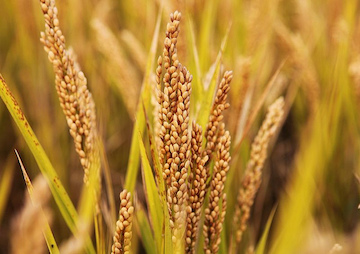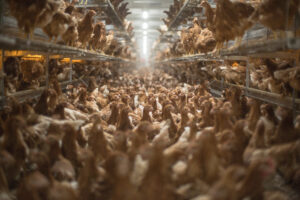Nobel Scientists Ask Greenpeace to Abandon Campaign Against Genetically Modified Crops
More than 100 Nobel laureates—about a third of those living—signed a letter urging the environmental advocacy group to end its opposition to the cultivation of genetically modified food.
More than 100 Nobel laureates—about a third of those living—signed a letter urging the environmental advocacy group Greenpeace to end its opposition to the cultivation of genetically modified food, especially a crop called golden rice.
Greenpeace has “misrepresented the risks, benefits and impacts” of genetically altered food plants, the scientists wrote. “There has never been a single confirmed case of a negative health outcome for humans or animals from their consumption.”
Scientific and regulatory agencies around the world have repeatedly and consistently found crops and foods improved through biotechnology to be as safe as, if not safer than those derived from any other method of production. There has never been a single confirmed case of a negative health outcome for humans or animals from their consumption. Their environmental impacts have been shown repeatedly to be less damaging to the environment, and a boon to global biodiversity.
Greenpeace has spearheaded opposition to Golden Rice, which has the potential to reduce or eliminate much of the death and disease caused by a vitamin A deficiency (VAD), which has the greatest impact on the poorest people in Africa and Southeast Asia.
The World Health Organization estimates that 250 million people, suffer from VAD, including 40 percent of the children under five in the developing world. Based on UNICEF statistics, a total of one to two million preventable deaths occur annually as a result of VAD, because it compromises the immune system, putting babies and children at great risk. VAD itself is the leading cause of childhood blindness globally affecting 250,000 – 500,000 children each year. Half die within 12 months of losing their eyesight. …
Roberts said he has worked on previous campaigns that sought to leverage the influence of Nobel laureates. In 2012, for example, he organized a campaign to persuade Chinese authorities to release from house arrest the human rights activist and Nobel Peace Prize laureate Liu Xiaobo. Roberts said he decided to take on the GMO issue after hearing from scientific colleagues their research was being impeded by anti-GMO activism from Greenpeace and other organizations. He said he has no financial interest in GMO research.
The Washington Post reported:
The letter campaign was organized by Richard Roberts, chief scientific officer of New England Biolabs and, with Phillip Sharp, the winner of the 1993 Nobel Prize in physiology or medicine for the discovery of genetic sequences known as introns. The campaign has a website, supportprecisionagriculture.org, that includes a running list of the signatories, and the group plans to hold a news conference Thursday morning at the National Press Club in Washington.
“We’re scientists. We understand the logic of science. It’s easy to see what Greenpeace is doing is damaging and is anti-science,” Roberts told The Washington Post. “Greenpeace initially, and then some of their allies, deliberately went out of their way to scare people. It was a way for them to raise money for their cause.”
Roberts said he endorses many other activities of Greenpeace, and said he hopes the group, after reading the letter, would “admit that this is an issue that they got wrong and focus on the stuff that they do well.” …
Nobel laureate Randy Schekman, a cell biologist at the University of California at Berkeley, told The Post, “I find it surprising that groups that are very supportive of science when it comes to global climate change, or even, for the most part, in the appreciation of the value of vaccination in preventing human disease, yet can be so dismissive of the general views of scientists when it comes to something as important as the world’s agricultural future.”
Greenpeace representative Wilhelmina Pelegrina responded to the letter:
“Accusations that anyone is blocking genetically engineered ‘Golden’ rice are false. ‘Golden’ rice has failed as a solution and isn’t currently available for sale, even after more than 20 years of research. As admitted by the International Rice Research Institute, it has not been proven to actually address Vitamin A Deficiency. So to be clear, we are talking about something that doesn’t even exist.
“Corporations are overhyping ‘Golden’ rice to pave the way for global approval of other more profitable genetically engineered crops. This costly experiment has failed to produce results for the last 20 years and diverted attention from methods that already work. Rather than invest in this overpriced public relations exercise, we need to address malnutrition through a more diverse diet, equitable access to food and eco-agriculture.”
On alternative solutions:
“The only guaranteed solution to fix malnutrition is a diverse healthy diet. Providing people with real food based on ecological agriculture not only addresses malnutrition, but is also a scaleable solution to adapt to climate change.
“We’ve documented communities across the Philippines that continue to express concerns about using GE ‘Golden’ rice as a solution. It is irresponsible to impose GE ‘Golden’ rice as a quick remedy to people on the frontlines and who do not welcome it, particularly when there are safe and effective options already available.
“Greenpeace Philippines is already working with NGO partners and farmers in the Philippines to boost climate resiliency. There’s a real chance here for governments and the philanthropic community to support these endeavours by investing in climate-resilient ecological agriculture and empowering farmers to access a balanced and nutritious diet, rather than pouring money down the drain for ‘Golden’ rice.”
The Washington Post added:
Virtually all crops and livestock have been genetically engineered in the broadest sense; there are no wild cows, and the cornfields of the United States reflect many centuries of plant modification through traditional breeding. Genetically modified crops started to become common in the mid-1990s; today, most of the corn, soybeans and cotton in the country have been modified to be resistant to insects or tolerant of herbicide, according to government statistics.
While the Nobel laureates’ claims may be scientifically sound, they do not address concerns about the corporate dominance of agriculture, a trend associated with the privatization of crops, which makes it difficult or impossible for small farmers to make a living, and a reduction in the variety of crops available, which can result in poor diets that damage human health.
—Posted by Alexander Reed Kelly.
Your support matters…Independent journalism is under threat and overshadowed by heavily funded mainstream media.
You can help level the playing field. Become a member.
Your tax-deductible contribution keeps us digging beneath the headlines to give you thought-provoking, investigative reporting and analysis that unearths what's really happening- without compromise.
Give today to support our courageous, independent journalists.






You need to be a supporter to comment.
There are currently no responses to this article.
Be the first to respond.